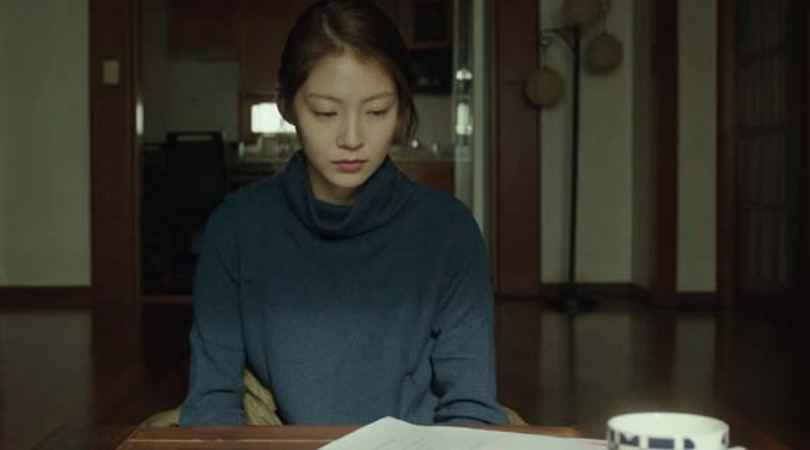
Grief can become a void if you let it. It can swallow you whole and push you further into loneliness if you let it. That’s what happens to Jina (Gong Seung-yeon) in Aloners, the feature-film debut for writer-director Hong Sung-eun.
Hong cleverly uses sound elements to make it seem as if Jina isn’t alone in the beginning. The sounds of a video on her phone or a TV left on when she arrives home, the voices give the illusion of connection before you realize they’re hollow. At first, the loneliness feels rewarding—a self-imposed isolation that allows Jina to be her own person outside of familial pressure. But slowly, it creeps into something more.
Jina lives in a small apartment in an unassuming apartment building. She’s in her twenties, the top employee at a call center, and she’s suffocatingly isolated—and she likes it that way. When she leaves home to go to work, she puts her headphones on and never takes her eyes off of her phone. When she gets home, she watches TV, the only voices in her home that aren’t hers. Even the neighbor, who is constantly trying to make contact with her in the hallway, cannot breach the impenetrable fortress she’s built around herself. And, of course, she ignores her father’s calls from her mother’s phone number. He wants to talk about the inheritance, and she wants nothing to do with it.
But, when Jina’s neighbor dies alone in his apartment, Jina begins to question the solitude she’s crafted. A look at what is called holojok in Korean, people who prefer to be left alone in one-person households away from family, Aloners intricately untangles the complexity of isolation. Why we choose it, why it grows, and if we can ever be alone without feeling lonely.
As a character study, Jina’s choice to be alone maps out intergenerational relationships as she dodges calls from her family about her mother’s death, the fear of being alienated in the workplace as she attempts to stay under the radar, and of course, how Jina’s safety in her isolation can be shaken when she starts to feel the loneliness creep in. It’s a slow creep at first, driven by seeing similarities between herself and the man next door who was crushed by his magazine stacks. Then, it’s pushed by her grief over her mother’s death, and it culminates in Jina making small acts of connection. Of course, the connection is made her way, but it’s done nonetheless as she begins to watch surveillance videos from a camera in her family’s house as much as she watches random ones she has no connection to.
Slowly, the acts she found solace in, like eating noodles alone, a video of food playing beside her bowl, begin to carry weight. The acts of solitude warp into acts that scream loneliness, and it’s Jina’s silence and push against the emotion she’s feeling that adds to the film’s atmosphere. Additionally, silence and space are the elements that Hong uses to showcase isolation even when Jina is sitting with her family, at her desk; the two seats between her and her father feel like a cavern, and the noise from the TV works as Jina’s response. It’s how she puts distance between herself and a new worker despite being almost cheek to cheek in a cubicle. Even when next to others, Jina feels alone.
As the film begins the third act, the loneliness has taken hold, and Jina is left to navigate it. She tries to hold her composure and the life she’s crafted for herself, but the threads begin coming apart. The solace has turned to anxiety. The calmness has turned to restlessness. And the silence has become shattering. While the film’s color palette and sound design are clear atmospheric elements that help the film’s narrative, its Gong’s stunning and somber performance that pushes Aloners to another level. Slowly coming apart at the seams, Gong’s ability to act in silence, her ability to show a slow breaking of resolve, makes Aloners hit home.
Aloners isn’t some grand narrative with dramatic plots or sets or even costuming. Instead, it’s a slice of life. It’s a slice of solitude. It’s a look into what it feels like not to process your grief and what happens when it rushes over you and leaves you in pain. It’s about the fear of goodbyes and what it feels like to have the walls you built for your own safety become the thing that keeps you from expressing your pain.
Aloners is a stunning and solemn debut feature for Hong Sung-eun. Additionally, her debut role as Jina Gong Seung-yeon is painfully beautiful, and her silence and vulnerability are both captivating and emotionally resonant. This is a story about grief, longing, and the fears that trap us when we think they’re our savior.
Aloners screened at the 2021 Toronto International Film Festival.
Aloners
-
Rating - 9.5/109.5/10
TL;DR
Aloners is a stunning and solemn debut feature for Hong Sung-eun. Additionally, her debut role as Jina Gong Seung-yeon is painfully beautiful, and her silence and vulnerability are both captivating and emotionally resonant. This is a story about grief, longing, and the fears that trap us when we think they’re our savior.






